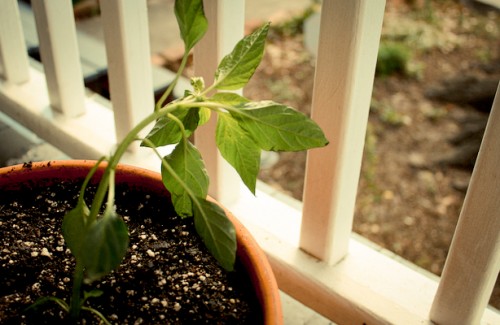Thanks to container gardening, it’s possible for urbanites and apartment-dwellers to grow their own food – even when space is at a premium. Getting in on the grow-your-own-food movement through container gardening comes with plenty of perks: Communing with Mother Nature, saving money and enjoying fresh-from-the-vine produce. But “farming” indoors, on balconies and in small yards has loads of other eco benefits. Our friends at Earth911 have come up with 5 fantastic reasons to start a container garden.

1. Shrink your carbon footprint
Produce is shipped for an average of 1,500 miles before being sold, according to a study conducted by Rich Pirog, associate director of the Leopold Center for Sustainable Agriculture at Iowa State University.
In the study, which analyzed the transport of 28 fruits and veggies to Iowa markets via local, regional and conventional food distribution, Pirog found that that conventional food distribution systems used 4 to 17 times more fuel and emitted 5 to 17 times more CO2 than local systems.
To shrink the carbon footprint of your daily meals, opt for locally-grown produce whenever possible – and you can’t get much more local than your own container garden!
2. Reduce packaging waste
Most store-bought produce creates little or no packaging waste if you bring your own bag. But some picks leave you with annoying (and often non-recyclable) packaging to dispose of. Think: Berries in square plastic containers and spinach packaged in plastic bags. Canned and jarred produce, which is often the only option for off-season veggies in cool-weather climates, can also leave your trash cans inordinately full.
But as you may have guessed, produce from your container garden is blissfully packaging-free – meaning more taste and less waste! Use our freezing and canning guide to preserve extra produce from your container garden at the end of the season – giving you plenty of fresh, waste-free produce all year long.
3. Enjoy healthier produce
Most produce is picked four to seven days before arriving on supermarket shelves, meaning fruits and veggies are often picked before their time so they won’t spoil on the long journey.
Tomatoes, for example, are typically picked when they’re still green. Although the color will change by the time you buy them, essential vitamins and nutrients didn’t have time to fully develop – making for a less-than-beneficial bite.
Transport can also take a toll on the nutrient content of your produce. Even when temperature and humidity are optimal from harvest to supermarket, there is some nutrient loss during days-long trips, according to a study published by Harvard Medical School’s Center for Health and the Global Environment. Faulty temperature controls and bruising damage accelerate nutrient loss, the study showed.
To make sure your produce is packed with vitamins, minerals and other healthy good stuff, opt for locally-grown produce from a farmer’s market in your neighborhood, along with fresh-from-the-vine picks from your container garden.
4. Improve indoor air quality
Container gardening indoors has many benefits for you and your environment. In addition to adding a welcoming touch to your rooms and providing a small space solution for your container gardening endeavors, growing live plants indoors can help clean the air, reduce noise pollution and even improve your health, according to a NASA study.
In 1973, NASA scientists identified 107 volatile organic compounds (VOCs) in the air inside the Skylab space station. Occupants often suffered from burning eyes and respiratory difficulties, later learned to be two of the most common symptoms of Sick Building Syndrome.
Meanwhile, B.C. “Bill” Wolverton, an environmental scientist working with the U.S. military, discovered that swamp plants actually eliminated Agent Orange from water samples. Expanding on this idea, Wolverton tested out the use of houseplants as a means of improving indoor air quality and found that growing plants indoors not only eliminates VOCs from the air but also dampens noise pollution – making an indoor ecosystem ideal for small urban dwellings.
Research has also suggested that plants play a psychological role in welfare, and that people actually recover from illness faster in the presence of plants, the study said. Check out these 15 houseplants that improve indoor air quality from Clean Air Gardening.
5. Stop worrying about food safety
With scary exposes about “the dirty dozen” and food recalls on popular crops like spinach and tomatoes, a growing number of Americans are concerned about food safety. But the good news is that when you responsibly grow your own food, you don’t have to worry about a thing!
Skipping sprays such as pesticides, herbicides and fungicides ensures that no toxic chemicals are lurking on the skin of your fruits and veggies – meaning these “grow-it-yourself” picks are just as natural as pricey organic produce from the supermarket.
Growing food yourself also eliminates risk of contamination that may occur at a farm or processing plant or during transport. A full belly and a worry-free mind? Sign us up!

